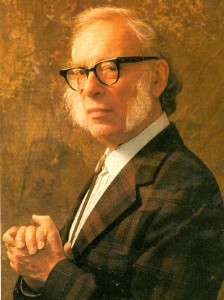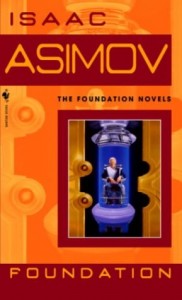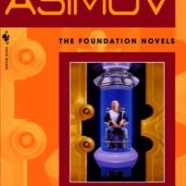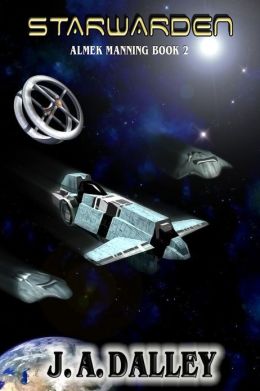Isaac Asimov – Foundation
 Foundation from Isaac Asimov is a very interesting story. It would appear that this story is broken up into several short stories, or several not so short stories. At times the separations of stories will catch you off guard. There are huge time gaps between the stories that make it one of those stories that you have to pay close attention to all the details as things go on. There’s more continuity to the politics and history of the Foundation than there is to the people in the story, and not in a bad way.
Foundation from Isaac Asimov is a very interesting story. It would appear that this story is broken up into several short stories, or several not so short stories. At times the separations of stories will catch you off guard. There are huge time gaps between the stories that make it one of those stories that you have to pay close attention to all the details as things go on. There’s more continuity to the politics and history of the Foundation than there is to the people in the story, and not in a bad way.
Foundation is based approximately 12,000 years in the future, and the galaxy is maintained by a single power referred to as the Galactic Empire. The story takes you through the next few hundred years as the beginning of 1,000 years of decay of the Galactic Empire begins to take place, even though the future would’ve held 30,000 years of death and destruction had the Foundation not been formed to create the Encyclopedia Galactica — an encyclopedia of all technology for future generations to learn from — keeping it from being lost in the destruction of the Galactic Empire.
 Now this is very much my style of reading, and I enjoyed it quite a bit. As a matter of fact I’ll probably go back and re-read the last two short stories in this book of four stories several times before I move onto another book. Many aspects of the story I now can see how they impacted current day sci-fi. For example, the main galactic homeworld apparently influenced greatly the Star Wars homeworld of Coruscant.
Now this is very much my style of reading, and I enjoyed it quite a bit. As a matter of fact I’ll probably go back and re-read the last two short stories in this book of four stories several times before I move onto another book. Many aspects of the story I now can see how they impacted current day sci-fi. For example, the main galactic homeworld apparently influenced greatly the Star Wars homeworld of Coruscant.
But above all in this story you will find tons, and tons, and tons of political manipulation and trickery, all in a good way. That’s not to speak of the science psychohistory that equates all large societies actions to basic mathematics allowing the prediction of future events. It provides for one of the most fascinating stories I’ve read in quite a while.
I look forward to the remainder of Isaac Asimov’s writing especially including his Robot series. I would rate this book and an 8 1/2 out of 10.












I think that is what I found most interesting about the book was the idea of psychohistory. In fact, if you think about it, it’s just looking at the past and basing future decisions on past outcomes, just on a grander scale. Too bad we don’t have a computer like that now. Or would that be a good thing?
Psychohistory was one of coolest parts, but the level of correct predictions was little scary.. No not sure it would be a good thing..